|
|
|
Sort Order |
|
|
|
Items / Page
|
|
|
|
|
|
|
| Srl | Item |
| 1 |
ID:
149049
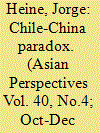

|
|
|
|
|
| Summary/Abstract |
Chile, a country that has been at the forefront of Latin America’s growing links with China, embodies a paradox in terms of Chinese outward foreign direct investment (COFDI). On the one hand, bilateral trade has thrived, increasing fourfold since the signing of a free trade agreement in 2005, turning Chile into China’s third largest trading partner in the region. On the other hand, Chinese direct investment in Chile has been low, much lower than in neighboring countries. In this article I explore the roots of this upsurge in bilateral trade while also explaining the reasons for the dearth of Chinese investment in a country traditionally considered to be attractive to foreign investors. Chile might be a victim of its own success as its economic accomplishments allow it to persist with investment policies that are currently daunting to Chinese investors.
|
|
|
|
|
|
|
|
|
|
|
|
|
|
|
|
| 2 |
ID:
149050


|
|
|
|
|
| Summary/Abstract |
In this article I analyze the “rule of law” policy, which the Chinese Communist Party (CCP) adopted as a principle of government at the 15th Party Congress in 1997. I investigate the emergence of rule of law policy and the context in which the CCP introduced it, then examine the concrete measures and actual implementation of the policy. I argue that the rule of law policy is the CCP’s attempt to institutionalize its legal and performance legitimacy. The policy comprises several parts, including intraparty regulations, comprehensive law education for leading cadres, and the readjustment of party-legislative relations. However, the policy has serious problems and consequently has achieved limited results.
|
|
|
|
|
|
|
|
|
|
|
|
|
|
|
|
| 3 |
ID:
149046


|
|
|
|
|
| Summary/Abstract |
In this article we explore the political economy of Chinese outward foreign direct investment (COFDI) in Brazil, and the impact of investment and other economic links on Brazilian foreign policy toward China. The warming of Brazil’s relations with China after 2003 had much to do with the perceptions of then president Luiz Inácio Lula da Silva, who was particularly impressed by the astounding growth of bilateral trade and believed the two countries shared a similar level of socioeconomic development. Lula’s domestic political challenges, the country’s prioritization of South-South relations, and some institutional changes further reshaped Brazil’s stance toward China. Unlike bilateral trade, Chinese investments did not exert a powerful influence on Brazilian policy toward China, though expectations of greater COFDI did have some impact.
|
|
|
|
|
|
|
|
|
|
|
|
|
|
|
|
| 4 |
ID:
149048
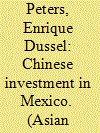

|
|
|
|
|
| Summary/Abstract |
Public, private, and academic institutions, in Mexico and bilaterally with China, ordinarily can facilitate long-range planning, rectify information gaps, and correct misunderstandings. But a dearth of such institutions has hindered the growth of Chinese outward foreign direct investment (COFDI) in Mexico and spurred negative reactions against it, further dampening Chinese investments. Structural trade imbalances, coupled with Mexican fears about the Chinese economic challenge, poison the political atmosphere in Mexico and between Mexico and China, also impeding COFDI. Besides exploring these problems, I provide background information on the bilateral political relationship, the features of COFDI generally and details of several Chinese investment projects in Mexico, and the two countries’ trade links. I offer some proposals designed to create a better foundation for the growth of COFDI in Mexico, a priority of both countries.
|
|
|
|
|
|
|
|
|
|
|
|
|
|
|
|
| 5 |
ID:
149052
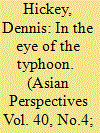

|
|
|
|
|
| Summary/Abstract |
In this study I analyze Taiwan’s policy toward the South China Sea dispute. I also examine two options that Taipei may wish to consider to address the growing instability in the area. I suggest that while some minor adjustments in policy might be warranted, it appears likely that Taiwan will resist significant changes to its present policy.
|
|
|
|
|
|
|
|
|
|
|
|
|
|
|
|
| 6 |
ID:
149047


|
|
|
|
|
| Summary/Abstract |
China has become a leading investor in Peru’s extractive sector over the past decade. In this article I discuss the impact of that investment on Peruvian foreign policy and build on interviews with senior executives of Chinese-owned corporations in Peru. As a sample case for Latin America, it recognizes the repercussions of China’s investments in national and regional development but argues that neither the firms nor Beijing imposes any significant political agenda on policymakers or legislators. I suggest, therefore, that government and local interest groups have a chance to harness China’s involvement for the benefit of social and environmental agendas, should they choose to do so.
|
|
|
|
|
|
|
|
|
|
|
|
|
|
|
|
| 7 |
ID:
149045
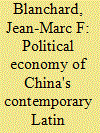

|
|
|
|
|
| Summary/Abstract |
There is a relative dearth of research on China–Latin America political economic relations, especially where Chinese outward foreign direct investment (COFDI) is concerned. In my introductory article, I aim to enrich our knowledge about how external and internal political and economic factors interact to shape Sino–Latin American links. I offer background information on Chinese investment in Latin America, identify several analytical questions that have arisen in conjunction with COFDI in Latin America, and specify some of the key findings of the other articles in this special issue. The contributors indicate that COFDI and other Sino–Latin American economic ties may not be dramatically reshaping host country foreign policies toward China, that positive political relations are not sufficient to ensure smooth economic relations or growing COFDI, and that the activities of Chinese firms in Latin America may be shaped by the host country’s institutional environment and their own operational interests rather than by any dictates from Beijing.
|
|
|
|
|
|
|
|
|
|
|
|
|
|
|
|
| 8 |
ID:
149051
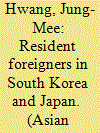

|
|
|
|
|
| Summary/Abstract |
Although South Korea and Japan tend to maintain their identity as nonimmigration countries, a policy agenda for foreign residents has incrementally emerged, especially since the 1990s. In this comparative analysis, I examine the status of permanent and long-term residents and relevant policy changes that enhance their social and political rights regardless of naturalization. Permanent residents in Japan can access social welfare benefits such as the national pension, public assistance, and child allowances, but they are excluded from local suffrage. In contrast, permanent residents of South Korea have political rights in local elections while welfare coverage for them is restricted to public insurance, with no public aid entitlement. This difference represents a policy gap, caused by inconsistencies in the process of policy revisions and different priorities in policymaking.
|
|
|
|
|
|
|
|
|
|
|
|
|
|
|
|
|
|
|
|
|